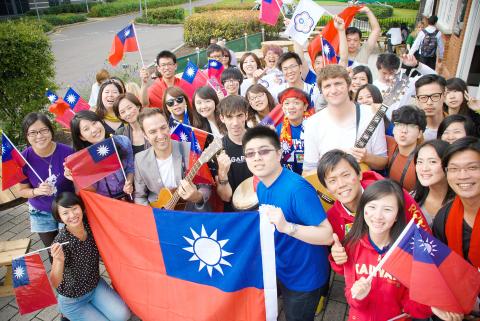The London Organising Committee of the Olympic and Paralympic Games (LOCOG) has allowed spectators to show small-sized Republic of China (ROC) national flags in venues of the Olympic Games, a Ministry of Foreign Affairs official said yesterday.
Hsu Mien-sheng (徐勉生), the director-general of the ministry’s Department of European Affairs, described the move as a “gesture of goodwill” extended to Taiwan after an ROC flag was removed from an array of 206 national colors, representing the nations competing in the Olympic Games, in a London street. The display was organized by the Regent Street Association.
The Taipei Representative Office in the UK had reached an understanding with the LOCOG that Olympic-venue security staff would allow spectators to dress in the colors of the ROC flag, paint the ROC flag on their faces, or bring small ROC flags with them to the venues, Hsu said.

Photo: courtesy of Chen Szu-wei
Hsu said that the display of the ROC flag in seating areas is not in compliance with the protocol signed between Taiwan and the International Olympic Committee (IOC) in 1981, known as the “Olympic Model,” to resolve issues stemming from a sovereignty dispute with China.
In accordance with the protocol, Taiwan competes in the Olympics under the name “Chinese Taipei” and is represented by the Chinese Taipei Olympic flag at Olympic venues, rather than the ROC flag.
“Strictly speaking, only the Chinese Taipei Olympic flag recognized by the IOC is allowed in Olympic venues, including its audience areas,” Hsu said.
According to a Central News Agency report, large ROC flags are still forbidden until changes are made to the model. Hsu did not verify that report, but he said the Olympics organizers do not allow spectators of any nationality to wave large national flags of any country, to keep them from disturbing other people in the audience.
The Chinese-language Liberty Times (the Taipei Times’ sister paper) reported that some Taiwanese spectators were warned by Olympics staff for waving large ROC flags to cheer on the country’s taekwondo athletes, Yang Shu-chun (楊淑君) and Wei Chen-yang (魏辰洋), during Wednesday’s matches.
A woman surnamed Chen (陳) told the Liberty Times that Olympics staff asked them not to wave the flag and even tried to grab their flag. She added that they were kept under close watch by staff members until they left.
Hsu said he was not able to verify the report.
He added that the nation’s representative office has on several occasions expressed concerns to the Regent Street Association over its replacing the ROC flag with a Chinese Taipei Olympic flag.
The LOCOG has confirmed that it advised the association to remove the ROC flag after a complaint from the Chinese embassy.
The association made it clear to the representative office that it “meant no disrespect” to Taiwan and felt sorry for any offense caused, Hsu said.
The association was “overloaded” with telephone complaints and e-mails from UK politicians, ordinary British citizens and people from other countries about the replacement of the ROC flag in the display, Hsu said.
Some members of the UK parliament also sent letters to the association to express their disapproval and demand a remedy, Hsu added.

SECURITY: As China is ‘reshaping’ Hong Kong’s population, Taiwan must raise the eligibility threshold for applications from Hong Kongers, Chiu Chui-cheng said When Hong Kong and Macau citizens apply for residency in Taiwan, it would be under a new category that includes a “national security observation period,” Mainland Affairs Council (MAC) Minister Chiu Chui-cheng (邱垂正) said yesterday. President William Lai (賴清德) on March 13 announced 17 strategies to counter China’s aggression toward Taiwan, including incorporating national security considerations into the review process for residency applications from Hong Kong and Macau citizens. The situation in Hong Kong is constantly changing, Chiu said to media yesterday on the sidelines of the Taipei Technology Run hosted by the Taipei Neihu Technology Park Development Association. With

A US Marine Corps regiment equipped with Naval Strike Missiles (NSM) is set to participate in the upcoming Balikatan 25 exercise in the Luzon Strait, marking the system’s first-ever deployment in the Philippines. US and Philippine officials have separately confirmed that the Navy Marine Expeditionary Ship Interdiction System (NMESIS) — the mobile launch platform for the Naval Strike Missile — would take part in the joint exercise. The missiles are being deployed to “a strategic first island chain chokepoint” in the waters between Taiwan proper and the Philippines, US-based Naval News reported. “The Luzon Strait and Bashi Channel represent a critical access

CARROT AND STICK: While unrelenting in its military threats, China attracted nearly 40,000 Taiwanese to over 400 business events last year Nearly 40,000 Taiwanese last year joined industry events in China, such as conferences and trade fairs, supported by the Chinese government, a study showed yesterday, as Beijing ramps up a charm offensive toward Taipei alongside military pressure. China has long taken a carrot-and-stick approach to Taiwan, threatening it with the prospect of military action while reaching out to those it believes are amenable to Beijing’s point of view. Taiwanese security officials are wary of what they see as Beijing’s influence campaigns to sway public opinion after Taipei and Beijing gradually resumed travel links halted by the COVID-19 pandemic, but the scale of

Pope Francis is be laid to rest on Saturday after lying in state for three days in St Peter’s Basilica, where the faithful are expected to flock to pay their respects to history’s first Latin American pontiff. The cardinals met yesterday in the Vatican’s synod hall to chart the next steps before a conclave begins to choose Francis’ successor, as condolences poured in from around the world. According to current norms, the conclave must begin between May 5 and 10. The cardinals set the funeral for Saturday at 10am in St Peter’s Square, to be celebrated by the dean of the College